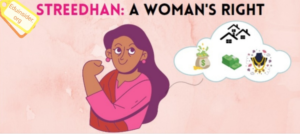The Streedhan policy in India refers to the legal framework that protects a woman’s right to her assets, gifts, and inheritances. It aims to ensure that women have control over their own wealth and property, safeguarding their financial independence and rights within marriage and family.

At last , while the Streedhan policy in India represents a significant step towards women’s economic empowerment and gender equality, it also faces various challenges and limitations. Addressing these challenges requires comprehensive efforts to raise awareness, strengthen legal enforcement mechanisms, and address underlying socio-cultural barriers that impede women’s access to their property rights. Additionally, promoting inclusive and equitable inheritance practices and enhancing women’s legal literacy are crucial for ensuring the effective implementation of Streedhan policies and advancing women’s rights in India as well.
Advantage :
1.Empowerment of Women:
The Streedhan policy empowers women by recognizing their right to property and wealth acquired through gifts, inheritance, or any other means. This recognition enhances women’s autonomy and financial independence, thereby contributing to their overall empowerment.2.Legal Protection:
The policy provides legal protection to women’s assets, ensuring that they cannot be arbitrarily seized or controlled by others, including family members or spouses. This protection helps safeguard women from financial exploitation and abuse.3.Gender Equality:
By acknowledging women’s right to property and wealth, the Streedhan policy promotes gender equality within the family and society. It challenges traditional patriarchal norms that often marginalize women’s economic rights and reinforces the principle of equal treatment under the law.4.Financial Security:
Streedhan assets serve as a source of financial security for women, especially in cases of divorce, widowhood, or other unforeseen circumstances. Owning property independently can provide women with a sense of stability and resilience against economic vulnerabilities.5.Investment in Women’s Welfare:
Recognizing and protecting women’s property rights can encourage families to invest in their daughters’ education and economic empowerment. This investment can have long-term benefits for women’s social and economic well-being, contributing to poverty reduction and sustainable development.
Challenges :
1.Cultural and Social Barriers:
Despite legal provisions, cultural and social barriers often prevent women from exercising their rights to Streedhan effectively. Deep-rooted patriarchal norms, family pressure, and lack of awareness can deter women from claiming their rightful assets or challenge discriminatory practices.2.Legal Complexity:
The legal framework surrounding Streedhan rights can be complex and cumbersome, especially for women with limited education or resources. Navigating legal procedures and enforcing property rights may require costly legal assistance, making it inaccessible to many women, particularly those from marginalized communities.3.Ineffective Enforcement:
In some cases, the enforcement of Streedhan rights may be weak due to bureaucratic inefficiencies, corruption, or societal bias. Women may encounter resistance or indifference from authorities when seeking redress for property-related disputes, undermining the efficacy of existing legal protections.4.Interference from Family Members:
Despite legal safeguards, women’s Streedhan assets may still face the risk of interference or control by family members, particularly in joint family structures or patrilineal societies. Women may experience pressure to relinquish their property rights or transfer assets to male relatives, limiting their autonomy and agency.5.Inheritance Disputes:
Inheritance laws in India vary across religious and cultural communities, leading to complex inheritance disputes that can affect women’s access to Streedhan. Conflicting legal provisions and customary practices may undermine women’s inheritance rights, perpetuating gender disparities in asset ownership.At last , while the Streedhan policy in India represents a significant step towards women’s economic empowerment and gender equality, it also faces various challenges and limitations. Addressing these challenges requires comprehensive efforts to raise awareness, strengthen legal enforcement mechanisms, and address underlying socio-cultural barriers that impede women’s access to their property rights. Additionally, promoting inclusive and equitable inheritance practices and enhancing women’s legal literacy are crucial for ensuring the effective implementation of Streedhan policies and advancing women’s rights in India as well.







